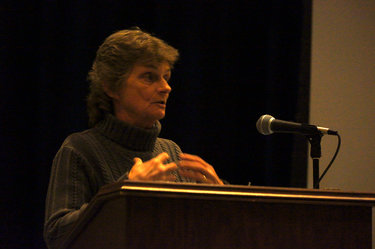Super proposes no tax increase, boost instruction
The Enterprise — Marcello Iaia
Sharon Nasner, a grandmother of five special-needs children, speaks in support of hiring a job coach for a new career-readiness credential during Monday’s school board meeting at Berne-Knox-Westerlo. It was one among many possibilities laid out by Interim Superintendent Lonnie Palmer for the upcoming budget year and Nasner spoke hopefully of the difference the role could make, part of the Career Development and Occupational Studies Commencement Credential, new this year.
BERNE — Berne-Knox-Westerlo Interim Superintendent Lonnie Palmer proposed on Monday not to increase the 2014-15 tax levy. Last year’s $21.53 million spending plan, which also had no levy increase, passed by a landslide for the first time in years.
Palmer noted a contingency budget of the same amount could be adopted even if the public were to vote it down.
Palmer recommended the board aim for a $21.77 million roll-over budget, an increase of about $240,000 in expenditures from the 2013-14 budget and invest in instruction. Along with this, he wants to settle contracts with the district’s two largest unions, and go ahead with the money-saving measures that he says can make the plan work.
He outlined $1.58 million that the board has at its disposal as it crafts the budget. This includes at least $204,000 in more aid expected from the state and a host of cost-cutting measures.
Since he arrived at the district last summer, Palmer said $604,000 in savings has been made beyond any costs factored into the current budget year. The savings come from the elimination of three bus runs, a secretarial position after a retirement, and four teacher aid positions. Five retiring teachers were replaced with newer, lower-paid ones, he said, a maintenance position was left unfilled, and a shared food services director with the Greenville Central School District added to the savings.
Interim Business Official Mark Kellett has calculated the district’s maximum allowable levy increase at 3.1 percent.
Possible reductions listed by Palmer included the combination of the district’s two kitchens and use of part-time staff or Board of Cooperative Educational Services (BOCES) staff. He said a supervisor of the maintenance department could be shared with Greenville. Palmer expects more bus routes could be eliminated, BOCES services could be used in the business office, and special-education classes now conducted in other districts could be hosted locally. The total potential savings would be between $450,000 and $675,000.
BOCES services cost the disrict less because a percentage of the expenses is reimbursed by the state.
Palmer estimated the net cost per year of settling contracts for both the teachers’ union and the Civil Service Employees Association would be $55,000.
Among the improvements Palmer gave as options for improving academic performance at BKW would be the addition of a job coach for special-education students, materials and texts for new curriculum, extra academic support tutors, additional full- and part-time teachers in music, art, and computer programming, equipment repair, and training and coaching for teachers.
A parent, Amy Anderson, suggested the board use its money for savings, to avoid the “horrible” experience of cuts in past years and build back programs over a longer period of time.
Elementary Principal Audrey Roettgers said, to improve student performance, teachers need time and training, part of Palmer’s recommendations, to comb through data as they work to teach with the new Common Core standards. She also said a full-time librarian could help BKW students become more comfortable with the increasing demands of technology.
What little opposition there was from community members who spoke after Palmer’s presentation was most often against his idea of sharing a supervisor for the maintenance department with Greenville. It would save $30,000 per year for BKW and remove Peter Shunney from the current head role.
A professional design engineer for the state’s Education Department, Daniel Lim, told the school board he reviews designs for school buildings from the across the state and met Shunney once in a five-minute meeting.
“In that five minutes, he went over and above my head in terms of his knowledge of his operating system here and how he ran things than I’ve seen in many of the professional design engineers that are out there,” Lim said of Shunney.
Palmer has said he expects Shunney would not lose a job if the plan goes through, but the requirements for the new role would be beyond Shunney’s qualifications.
Helen Lounsbury, a retired BKW teacher and former school board member, warned against reducing jobs in the community to save money.
“They knew you, they looked out for you,” she said of past kitchen workers at the school. “You can’t put a price on something like that.”
Most speakers and all the board members were grateful for Palmer’s “menu” of options for going forward in the budget process. The school board heard the information for the first time Monday night.
The board’s vice president, Vasilios Lefkaditis questioned whether the $604,000 in savings so far properly accounts for projected variations in retirement insurance and payroll taxes. He also said the cost of one of Palmer’s options for improving programs, the addition of seven teachers’ aids, outweighed the savings from reducing those position earlier in the year.
“The pitch was we could afford the contracts because of the savings,” Lefkaditis said of Teacher Support Staff contracts. He also cautioned against spending without a method of evaluating a program.
Palmer has planned a community forum for March and plans to meet with the district’s budget advisory committeee for more input. The committee, made up of the superintendent, students, district employees, residents, the business official, and board members, traditionally met several months before this time in previous years.
The budget deadline for adoption is late April, with a state-set public vote on May 20.



